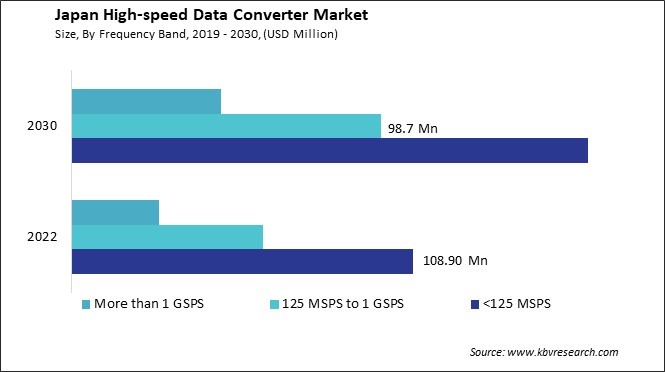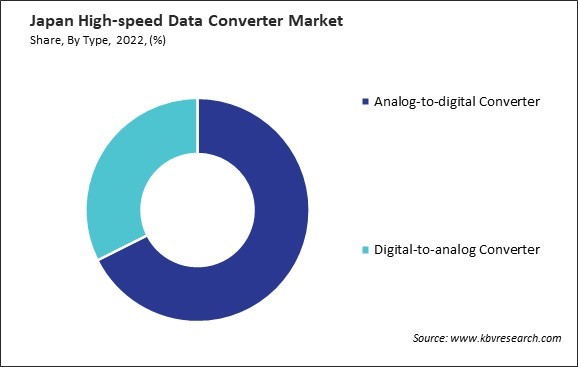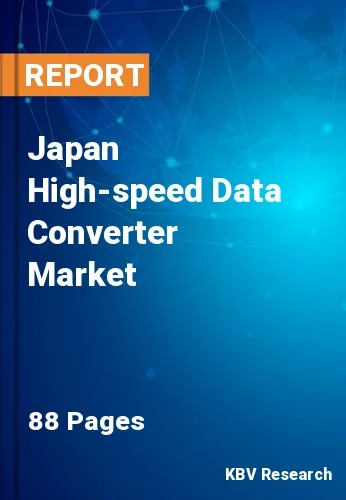The Japan High-speed Data Converter Market size is expected to reach $311.0 Million by 2030, rising at a market growth of 6.0% CAGR during the forecast period.
Japan's high-speed data converter market has been experiencing significant growth in recent years, driven by the increasing demand for high-performance electronic devices and communication systems. High-speed data converters are crucial in converting analog signals into digital data and vice versa, enabling seamless communication and data processing in various applications.

The COVID-19 pandemic measures and restrictions implemented to curb the spread of the virus affected the overall business environment, leading to uncertainties and challenges for market players. Despite these challenges, Japan's high-speed data converter market exhibited resilience and adaptability. The increased adoption of remote working and online communication during the pandemic highlighted the importance of robust data conversion solutions. As a result, a renewed focus has been on developing innovative and reliable high-speed data converters to meet the evolving needs of a rapidly changing business landscape.
Moreover, the post-pandemic recovery efforts and government initiatives to boost economic growth positively impact Japan's high-speed data converter market. The ongoing digital transformation across various industries further underscores the significance of high-performance data conversion technologies, providing a favorable environment for industry growth.
Japan's high-speed data converter market is characterized by a culture of continuous innovation. Companies are investing in research and development to create converters with higher speeds, lower power consumption, and improved performance. Advanced features such as ultra-wide bandwidths, enhanced resolution, and low-latency capabilities are becoming standard in the latest offerings.
The high-speed data converter market in Japan has witnessed significant growth, driven primarily by the increasing demand for advanced medical devices. The country's aging population and a growing emphasis on healthcare innovation have fueled the adoption of cutting-edge technologies in the medical sector, leading to a surge in high-speed data converters.
One of the key factors contributing to this growth is the constant evolution of medical imaging equipment. Japan has been developing and adopting state-of-the-art imaging devices like MRI scanners, CT scanners, and ultrasound machines. High-speed data converters play a pivotal role in enhancing the performance of these devices by ensuring faster and more accurate data processing, ultimately improving diagnostic capabilities.
Furthermore, the rise of telemedicine and remote patient monitoring in Japan has created a demand for medical devices that can transmit large amounts of data swiftly and reliably. High-speed data converters enable the seamless transfer of high-resolution medical images and real-time patient data, contributing to the efficiency of remote healthcare services.
According to the International Trade Administration, the medical devices industry in Japan achieved a significant milestone in 2021, reaching a total value of $40 billion. Concurrently, the demand for advanced medical devices is set to surge in Japan's high-speed data converter market. Hence, Japan's high-speed data converter market is experiencing significant growth, propelled by the increasing demand for advanced medical devices, particularly driven by the country's emphasis on healthcare innovation and the evolving landscape of medical imaging equipment.
Japan's high-speed data converter market has witnessed a remarkable surge in growth, particularly in the domain of converters with sampling rates exceeding 1 GSPS (Giga Samples Per Second). The demand for data converters with such high sampling rates is largely fueled by the burgeoning requirements of cutting-edge applications in sectors like telecommunications, automotive, and industrial automation. These converters are crucial in swiftly processing and digitizing signals, enabling real-time decision-making and enhancing overall system performance.
In Japan, the automotive sector has been a key driver of this growth, with the increasing integration of advanced driver-assistance systems (ADAS) and in-vehicle connectivity. The need for high-speed data converters is evident in the efficient sensor data processing and communication between various vehicle components.
Moreover, Japan's leadership in the telecommunications sector has spurred the demand for high-speed data converters as the country continues to pioneer the deployment of 5G technology. The rapid adoption of 5G networks necessitates using superior speed and precision converters to handle the increased data traffic efficiently.
The industrial automation sector in Japan has also witnessed a surge in demand for high-speed data converters, driven by the ongoing Industry 4.0 initiatives. As manufacturing processes become more data-intensive and interconnected, the role of high-speed converters becomes pivotal in ensuring seamless communication and control within smart factories. Therefore, the growth of >1 GSPS high-speed data converters in Japan is a testament to the nation's technological prowess and commitment to staying at the forefront of the global electronics industry.

Japan's high-speed data converter market is a vital component of the country's thriving electronics and technology sector, focusing on providing advanced solutions for applications ranging from telecommunications to industrial automation. Renesas Electronics Corporation is a key Japanese high-speed data converter market player. Renesas offers a diverse portfolio of analog-to-digital converters (ADCs) and digital-to-analog converters (DACs) tailored for various applications, including automotive, industrial, and consumer electronics. The company's data converter solutions emphasize high performance, low power consumption, and integration, aligning with the requirements of modern electronic systems.
ROHM Co., Ltd., a Japanese semiconductor and electronic component manufacturer, plays a crucial role in the high-speed data converter market. ROHM offers a variety of analog and mixed-signal ICs, including data converters, that find applications in automotive electronics, consumer electronics, and industrial equipment. The company's commitment to quality and innovation contributes to its prominence in the Japanese electronics market.
Advantest Corporation is recognized for its expertise in test and measurement equipment and contributes significantly to the Japanese high-speed data converter market. Advantest's testing solutions are crucial for ensuring the performance and reliability of data converters during manufacturing. The company's advanced testing technologies are vital in maintaining the high standards expected in the Japanese electronics industry.
AKM (Asahi Kasei Microdevices Corporation) specializes in providing high-performance analog and digital ICs, including data converters, for various applications. The company’s data converter solutions are widely used in audio systems, telecommunications, and consumer electronics. AKM's commitment to delivering high-quality components contributes to its standing in the Japanese market.
Fujitsu Semiconductor Limited, a subsidiary of Renesas Electronics Corporation, contributes to the Japanese high-speed data converter market with a focus on providing innovative semiconductor solutions. Fujitsu Semiconductor's offerings include data converters suitable for applications in communications, automotive, and industrial sectors. The company's commitment to research and development supports the continuous advancement of data converter technology. These companies play a crucial role in developing cutting-edge data converter solutions that meet diverse industries' demanding requirements, ensuring electronic systems' reliability and performance in Japan and beyond.
By Frequency Band
By Type
By Application
Our team of dedicated experts can provide you with attractive expansion opportunities for your business.

